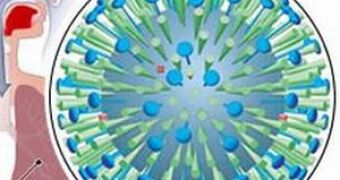Reuters announced that Biotech company MedImmune Inc., a firm focused on the areas of cancer, infectious and inflammatory diseases, and the U.S. National Institute of Health started testing yesterday a new nasal vaccine against avian influenza.
This type of vaccine has already proved to be safe and effective on seasonal influenza, but it has to be also examined the reaction of healthy subjects to it when it comes to pandemic strains of bird flu. There are enrolled around 20 people and each is administrated in the nostrils 2 doses of the anti-avian nasal spray.
The novelty of this vaccine consists in the fact that, on one hand, it is a live-virus vaccine, unlike the old vaccines developed to present date, which functioned with killed influenza viruses.
On the other hand, the actual manufacturing process of nasal vaccine is going to need fewer resources as compared to the shot vaccine, which required an incredibly high dosage, delivered in two separate injections for each individual in order to work properly.
Killed-viruses shots work by guiding the immune system to track down and eliminate flu viruses that closely resemble the ones contained in the dose administrated. Because the viruses in the serum of the shot are already extinct, they cannot be harmful to the body, therefore our safety is guaranteed, but the removal of the murderous viruses from within our bodies is not, apparently.
The new nasal vaccine keeps a balance between sufficiently weakening the virus they contain so as not to cause disease and retaining enough of the infectious nature of the virus to allow the vaccine to do its work.
After it has been administrated, the infectious benumbed virus works by activating the immune system's antibodies so as to protect against later exposure to natural full-strength viruses.
Nevertheless, no one knows yet if this new type of vaccine is going to work properly and fully protect us against the H5N1 virus. "Until you actually put the vaccine into volunteers, you have no way of predicting," Kathleen Coelingh, senior director of scientific affairs for MedImmune Inc. said.
In spite of this, the researcher expressed confidence that, even if the first results of testing will not be fully satisfying, the genetically engineered virus used for the nasal administrated vaccine can be employed for further studies and will eventually solve the problem.

 14 DAY TRIAL //
14 DAY TRIAL //